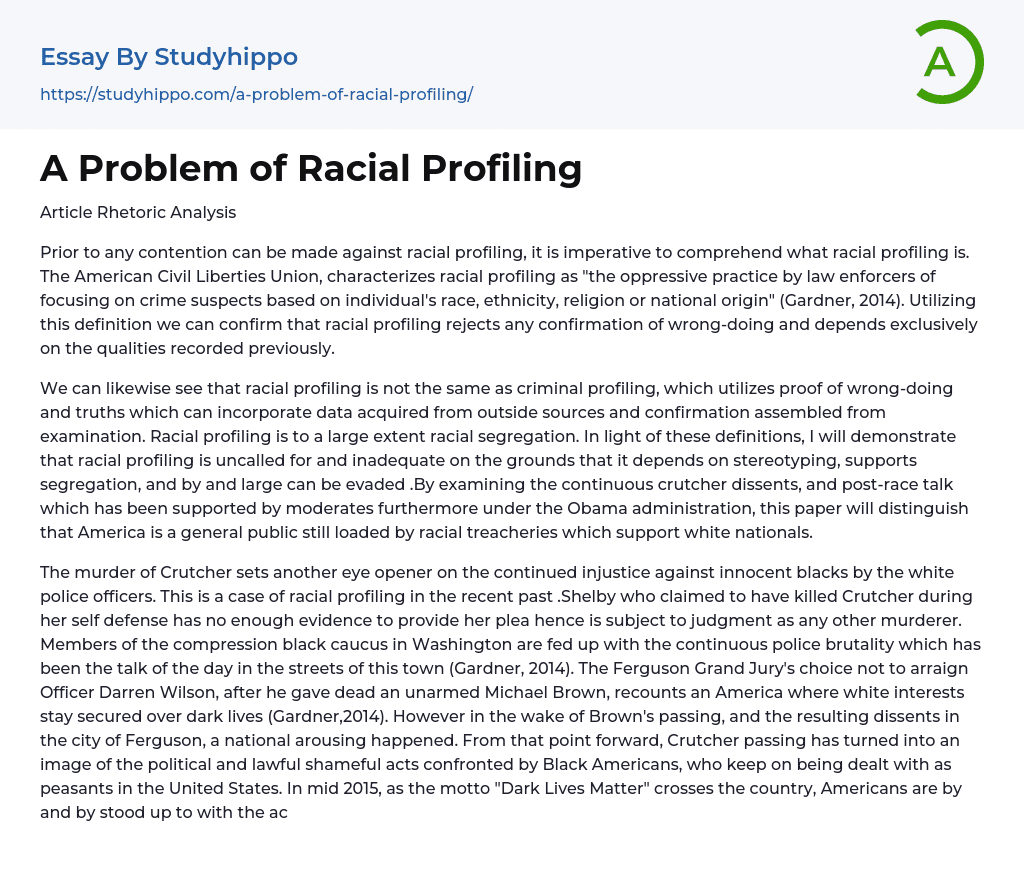Article Rhetoric Analysis
The article focuses on racial profiling and emphasizes the significance of comprehending its definition. As stated by the American Civil Liberties Union, racial profiling is when law enforcers target crime suspects based on factors such as race, ethnicity, religion or national origin (Gardner, 2014). This definition underscores that racial profiling dismisses any proof of guilt and instead concentrates solely on these mentioned attributes. It is important to distinguish racial profiling from criminal profiling, which relies on evidence and facts gathered from external sources and investigations.
Racial profiling, also known as racial segregation, refers to the act of stereotyping and promoting segregation. It is an ineffective and preventable practice. The ongoing protests against the mistreatment of African Americans, along with discussions on race during the Obama administration, highlight the enduring raci
...al injustices in America that predominantly benefit white citizens. The recent killing of Crutcher reveals another instance of racial profiling. Shelby, the officer who claims self-defense in Crutcher's murder case, lacks sufficient evidence to support her plea and should be treated like any other murderer. Members of the Congressional Black Caucus in Washington are frustrated with persistent police brutality and its prevalence on city streets. The decision by the Ferguson Grand Jury not to indict Officer Darren Wilson, who fatally shot unarmed Michael Brown, symbolizes a society that prioritizes white interests over black lives.
After Brown's death and the protests in Ferguson, there was a nationwide awakening. Now, Crutcher's death has become symbolic of the injustices experienced by marginalized Black Americans in the United States. In 2015, with the rise of the "Black Lives Matter" movement, Americans are once again faced with the reality tha
they live in two separate nations: one where race is no longer seen as significant and another where race still greatly impacts the fairness and freedom promised by the United States. It is important to recognize the significance of race in American politics.
The American political system has a lengthy history of racial enslavement, beginning with servitude and extending to the establishment of Jim Crow laws. Although some strides have been made in addressing racial tensions, a new division is arising between liberal 'race-conscious' policies and conservative 'color-blind' approaches. While the concept of a 'color-blind' America may appear attractive at first glance, claiming that US politics is color-blind or post-racial has detrimental effects on the enduring racial tensions and biases deeply ingrained in society. In actuality, 'color-blind' policies not only render race invisible but also suppress ongoing disparities and injustices.
Bigotry has become standardized in the United States as a result of over three centuries of authorized racial disparities. This historical context continues to have an impact today and cannot be easily resolved. Kareem Abdul-Jabbar's statement on the Ferguson riots emphasizes how the police and legal system are seen as maintaining a discriminatory status quo, perpetuating racial injustices. These racial disparities are rooted in governmental structures that thrive on racial persecution, and cannot be dismissed by deceptive discussions on race. The case of Crutcher exemplifies the social and political harm inflicted on black Americans, highlighting the negative connotations within a post-racial American society. Legal institutions have the power to disregard existing racial enslavements and abuses, leading to the deaths of innocent black individuals.
This passage highlights how the American political system favors white dominant political organizations at the
expense of the rights of black American citizens, allowing racial imbalances to persist. It argues that instead of ignoring racial disparities and injustices, society should acknowledge and address them. The passage also criticizes the legal system for failing to protect innocent black lives and for perpetuating white dominance, which necessitates bringing race back into political discussions. The Tulsa riots are cited as an example of the historical persecution of black people. The passage argues against hiding injustice through colorblind rhetoric, as it only serves to perpetuate racist attitudes.
The utilization of timber in the United States represents a commemoration of an innocent black life that was lost and the numerous other black lives that have endured unjust treatment. It is crucial to reintroduce race into political discourse as a means to acknowledge and rectify the persistent institutional racism in America.
References
- Gardner, T. G. (2014). Racial Profiling as Collective Definition. Social Inclusion, 2(3), 052-059.
- Malcolm X essays
- Black Lives Matter essays
- Antisemitism essays
- Ku Klux Klan essays
- Miscegenation essays
- Racial Segregation essays
- I Have a Dream essays
- Martin Luther King essays
- Racial Inequality essays
- Black History Month essays
- Black People essays
- Ageism essays
- Cultural Diversity essays
- Discrimination essays
- Diversity essays
- Gender Discrimination essays
- Multiculturalism essays
- Oppression essays
- Peer Pressure essays
- Racial Profiling essays
- Sexism essays
- Abortion essays
- Abuse essays
- Animal Rights essays
- Animal Testing essays
- Assault essays
- Bullying essays
- Controversial Issue essays
- Crash essays
- Cyber Bullying essays
- Feminism essays
- Human Rights essays
- Immigration essays
- Inequality essays
- Poverty essays
- Prejudice essays
- Racism essays
- Torture essays
- Violence essays




